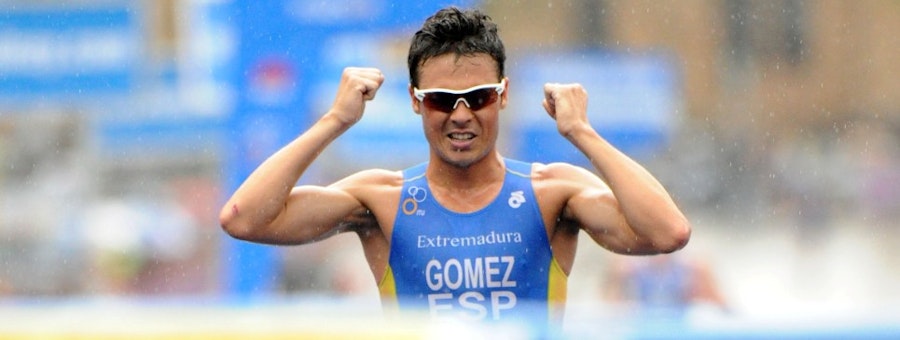
Your video is loading. If the video fails to load please upgrade your Flash player
In addition to the ITU Photo of the Year competition, which takes you back to relive the 2011 Dextro Energy Triathlon ITU World Championship Series through the best pictures, we’re also running a WCS Winners series. This aims to recall some of the best series moments this year and give a bit more insight to those who created them. This week, as we are taking a look at the season opener in Sydney, it’s two-time ITU World Champion Javier Gomez and that epic comeback.
It’s no surprise that after the last three years of men’s triathlon the original preview for this year’s men’s Dextro Energy Triathlon ITU World Championship Series looked like battle between two, Spain’s Javier Gomez and Great Britain’s Alistair Brownlee. Coming into this season, Gomez had two ITU World Championships, and Alistair Brownlee one (2009) but the most Dextro Energy Triathlon Series wins in 2009 and 2010. That both are equipped with deadly, often sub-30 minute runs, and have already battled against each other in that stage before only added to it.
But this year’s opening Dextro Energy Triathlon Series round was the first time both Brownlee and Gomez had actually met in Round 1. Neither raced in Tongyeong in 2009, or Sydney in 2010. The stage was set for an epic race, and Gomez provided it.
All About Javier
Age: 28
ITU World Championships: 2 (2008, 2010)
Dextro Energy Triathlon Series wins: 3
ITU World Cup wins: 12
Where he calls home: Pontevedra, Spain
Interesting fact: A cardiac anomaly threatened to derail his career early, but he was cleared by doctors in 2003 and has been one of triathlon’s biggest stars since.
What he does outside of triathlon: Play guitar, read, bodysurf, travel
You can follow Javier on Twitter @Jgomeznoya
After the swim in Sydney’s world-famous harbour, Alistair Brownlee – along with younger brother Jonathan Brownlee – jumped out early. But Gomez was just on their heels. Although a few athletes tried to break at different stages in the first lap, no-one did and a huge leading pack of around 30 formed. Then the rain started to fall, and with it the athletes. France’s Tony Moulai, Mexico’s Francisco Serrano and New Zealand’s Clark Ellice all took a tumble on the wet road, before what appeared to be the real game changer. Gomez fell hard on a corner and as he picked himself up, he watched the peloton glide past. Clearly grimacing, and with road rash visible, Gomez later admitted that even he thought his day might be over.
“I was just about to give up on the bike. I thought it wasn’t my day, I better stop and think about the next one,” Gomez said in Beijing, later in the season.
But instead he just got back on his bike and started to accelerate up the hill that led back through transition. The comeback had clearly started. Gomez still had the leaders in sight then, but the last of the large pack was about 400 metres away. The chase pack were further behind, and therefore his only option to stay in the hunt was to time trial solo and try and catch them again. Just before T2, he did. But coming in with the tail of a huge group meant he left T2 second last, about 30 seconds down on the leading group. But just as quickly as the Brownlee brothers broke off the front, along with Australia’s Brendan Sexton, France’s David Hauss and Switzerland’s Sven Riederer, Gomez had surged ahead and was within sight of them.
“I managed to overtake 45 guys and I just tried in the last lap and I was here with a good one so let’s go,” said Gomez.
ITU commentator Barrie Shepley wondered out loud if it was possible, “Just look at the fatigue on Javier Gomez’s face, you have to wonder if he’s got anything left in those legs. Just to time trial up on that bike must have taken a huge effort and now he’s trying to go a 30minute 10km run.”
But it seemed that was exactly what he was trying to do, as on the second lap, he caught that front group of five. Then came another game changing moment, and the rain claimed another victim. Alistair Brownlee slipped and fell on a corner. Gomez started to pull away at the two kilometre mark and in the final kilometre, powered further ahead to what he labelled his toughest win ever. With a sore hip, and visible road rash, he said he didn’t have the right tires for wet weather and almost crashed a few times before finally losing his grip. But he felt ok on the run, and went for it and finished with a split of 30 minutes and 9 seconds, 20 seconds faster than Joanthan Brownlee.
“When I crossed the finish line, it was a great feeling,” reflected Gomez. “When you win with such hard work, it always tastes better than other wins.”
The rest of Gomez’s season never quite reached that peak, as the Brownle’s reached another level on the way to their 1-2 ITU World Championship finish. The Spainard’s season was still ultra-consistent, he finished with overall bronze, but his only other win came at an ITU Premium European Cup in Banyoles. His next best was silver in Lausanne, where Jonathan Brownlee reversed Sydney and proved he was the best in the world at sprint distance. But the Sydney win was a reminder of what Gomez is capable of. And if the mark of a champion is how they get back up after they’ve been knocked down, Gomez lived up to that benchmark in Sydney.









